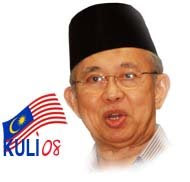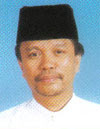
You’re my man: Prime Minister Datuk Seri Abdullah Ahmad Badawi giving a pat on the shoulder to Datuk Seri Najib Tun Razak after announcing Najib as his successor. Abdullah said he would step down in June 2010 and hand over his duties to his deputy. – ART CHEN / The Star

Friday July 11, 2008
Politicians must work together to face crisis
Comment by V.K.Chin
IT will be great if all political parties and non-governmental organisations can sink their differences and work to face the serious financial and economic issues caused by the global rising cost of fuel.
Politicians from different camps must naturally take the lead since they have been given the support to look after voters’ interests and meet their aspirations and expectations.
However, those from the ruling party, that is the Barisan Nasional, must take the lead since they hold the reins of power and can make key decisions to ensure a better future for the people.
Barisan leaders will have to come up with concrete and workable policies to alleviate the people’s present hardship due to rising costs of fuel, food, utilities, services and transport.
But the opposition Keadilan, DAP and PAS must also give their support to such efforts when the nation is facing a financial and economic crisis, which could have dire consequences if not properly handled.
The public is getting uneasy with the continuing political bickering being engaged almost on a daily basis with both sides trying to smear each other to score points.
The people feel that all this sniping and undermining must stop and they expect all those elected, especially the Opposition, to give their full attention to curb the rising cost of living.
They are dismayed that in spite of giving the Opposition a stronger mandate, these elected representatives are not doing a proper job either in Parliament or state assemblies.
Some of these MPs appear to be more active outside Parliament than inside.
Instead of raising their plight in Parliament, many government and opposition members are spending too much time quarrelling with each other rather than debating bread-and-butter issues.
If the present trend continues, the people may get so fed up that they may take things into their own hands and may not take part in future elections.
Therefore, both government and opposition members must start realising that they have been elected to shape policies beneficial to the people and not to create a scene to disrupt meetings.
Once this difficult stage has been overcome, then they can play politics again. While the Barisan has been taught a good lesson in the 2008 general election, the Opposition too must realise that their success is not a licence to create mischief, disrupt or to serve their personal agenda.
If their actions are seen to be contributing to instability and chaos to the effect that the federal government cannot govern properly, then voters will believe that they might as well stick with the Barisan.
It is now entirely up to those in charge of the federal or state governments to uphold the trust placed in them by voters or face rejection in the next round.










